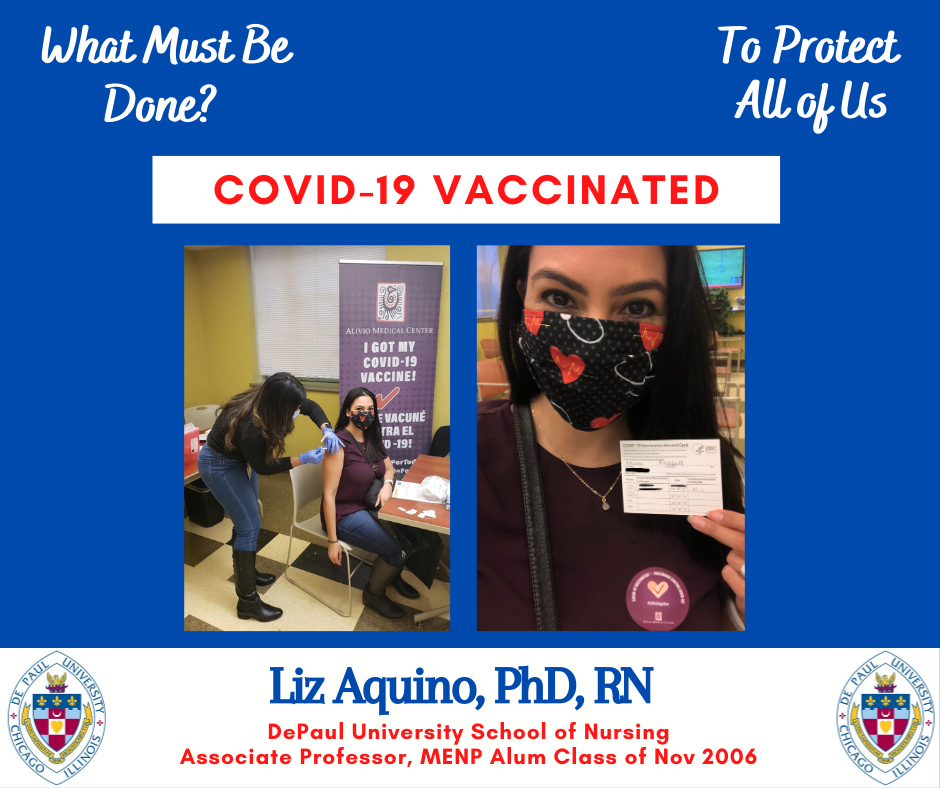 Elizabeth Aquino, associate professor of nursing, receives the COVID-19 vaccine. Aquino says people trust nurses, and nurses trust the safety and effectiveness of the vaccine. (Images courtesy of Elizabeth Aquino)
Elizabeth Aquino, associate professor of nursing, receives the COVID-19 vaccine. Aquino says people trust nurses, and nurses trust the safety and effectiveness of the vaccine. (Images courtesy of Elizabeth Aquino)
When responding to a crisis, School of Nursing faculty member Elizabeth Aquino asks herself the Vincentian question, “What must be done?” At this point in the pandemic, Aquino is using research and social media to boost the COVID-19 vaccination effort. Through her nursing background, research and community service, Aquino has focused on responding to the structural and social determinants of health that contribute to health disparities. Aquino is the current president of the American Nurses Association-Illinois and an associate professor in the School of Nursing.
Vaccination is ramping up around the country. Some people are eagerly awaiting their shot, while others have questions. As a nurse, what facts do you want people to know about the COVID-19 vaccine?
The benefits of the COVID-19 vaccine outweigh the risks of contracting COVID-19. Even if one contracts and survives COVID-19, there are potential debilitating long-haul effects that can significantly affect one's quality of life. It's not worth the risk. Researchers have found one-third of people who contracted COVID-19 experience symptoms such as brain fog affecting their ability to work or focus, headaches, fatigue, joint pain, loss of smell and taste and cardiovascular effects.
Getting vaccinated protects ourselves, our loved ones and people we come in contact with every day. It is all of our social responsibility to do our part to protect one another and getting the COVID-19 vaccine helps fulfill that duty to one another.
For those with concerns about the COVID-19 vaccine being developed too quickly, we must consider scientists have been studying vaccine development for decades and technology has significantly advanced, allowing for scientific studies to accelerate. The FDA process for approving the vaccines has determined the vaccines are safe and effective. If you still don't feel comfortable getting the vaccine or have questions about whether you should get the COVID-19 vaccine, ask health care experts like your primary healthcare provider and go to reputable sources like http://cdc.gov to make an informed decision.
There seems to be hesitancy about the COVID-19 vaccine in Black and Latinx communities. Where do those concerns stem from, and what must be done to address them?
Black and Latinx communities have experienced a disproportionate burden of COVID-19 cases and mortality, yet many are hesitant to get the COVID-19 vaccine because of distrust in the safety and effectiveness of the vaccine. Vaccine hesitancy and health care distrust result from a history of harmful and unethical clinical research, including the Tuskegee experiment on Black men and birth control trials on Puerto Rican women, to just name a few.
Additionally, and unfortunately, people of color often experience perceived racial discrimination when seeking healthcare, leading to poorer health outcomes. Deep racial and ethnic inequities and health disparities persist because of structural racism. We must address the root causes of inequities and build trust. Vaccination distribution plans must do many things: Prioritize equitable access to vaccines especially in communities hardest hit by the pandemic; eliminate barriers to vaccine registration; work with trusted community based organizations and key stakeholders to identify effective distribution approaches and vaccine promotion; provide vaccine education that is culturally and linguistically appropriate; and correct misinformation so that individuals can make informed decisions about getting the vaccine.
DePaul School of Nursing faculty, students and alumni have been sharing vaccine selfies on social media. Why did you help create that campaign?
People trust nurses. For 19 years in a row, nurses have led the Gallup Poll ranking as highest in honesty and ethics. So nurses and nursing students are the perfect ambassadors to help increase the public's confidence in receiving the vaccine to help protect themselves and others.
I helped create a social media COVID-19 vaccine selfie campaign featuring DePaul School of Nursing students, faculty and alumni so the public can see nurses and nursing students are getting their COVID-19 vaccine. Hopefully, it helps encourage others to do the same when it's their turn. You can see more on our Facebook and Instagram.
How does the campaign tie in to the Vincentian mission?
Each social media post includes the Vincentian question "What must be done?" St. Vincent de Paul calls us to take action in service of others and to contribute to the collective good. Members of our DePaul nursing community have taken action by getting the COVID-19 vaccine, and others are pitching in by volunteering in the local effort to administer vaccines.
For more information, visit DePaul's COVID-19 vaccine website.